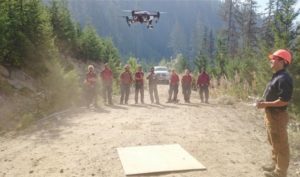 A group of Canadian search-and-rescue volunteers wants the British Columbia government to draft a policy permitting drone-related SAR missions.
A group of Canadian search-and-rescue volunteers wants the British Columbia government to draft a policy permitting drone-related SAR missions.
Coquitlam Search and Rescue recently petitioned the B.C.’s provincial emergency-management agency to allow drone pilots to obtain a Special Flight Certificate from Transport Canada – an authorizing document similar to the FAA’s Section 333 exemptions issued to American UAV users. Other B.C. SAR teams have also expressed interest.
Coquitlam launched a UAV feasibility study with Canadian drone firm Kaizen Kinetics International (formerly North Guardian) in 2013.
The Coquitlam group has hedged its regulatory bets by creating its own set of rules that surpass current national standards. The rules specify that UAV teams will not pilot SAR drones more than 400 foot above the ground and will keep clear of airports within five miles.
The Royal Canadian Mounted Police has been using rescue drones since 2010 and Emergency Management B.C. (British Columbia’s provincial public-safety agency), says drone use has potential as a valuable tool for emergency response.
“Rather than rush in … full bore, getting approval from EMBC will get better results, to set standards for the province rather than one individual group,” Coquitlam spokesperson Michael Coyle said in an interview with the Vancouver Sun.
“Based on our experience with these devices, there are several incidents in the past few years where we believe we could have used a UAV,” Coyle added in an earlier Coquitlam press release. “We’re very interested in how they can speed up a search, or provide communications to remote areas.”
The marriage of volunteer SAR groups with drone technology has grown exponentially over the past three years. Air Bears, for example is a global network of volunteer drone pilots that offers assistance to local emergency agencies for SAR operations. Since 2014, Air Bears volunteers have helped facilitate the rescue of four missing persons. In February, the group began lobbying for the Micro Drone amendment to the AIRR Act, which would exempt drones under 4.4 pounds from certain FAA certification requirements.
In 2014, Texas volunteer SAR group Equusearch assisted in a search for a 57-year-old Montgomery man after the group won a lawsuit filed against the FAA. The agency had grounded the volunteer group with a cease-and-desist e-mail. However, an appeals court stated the e-mail was “not a formal cease-and-desist letter representing the agency’s final conclusion that an entity has violated the law.”
Jason is a longstanding contributor to DroneLife with an avid interest in all things tech. He focuses on anti-drone technologies and the public safety sector; police, fire, and search and rescue.
Beginning his career as a journalist in 1996, Jason has since written and edited thousands of engaging news articles, blog posts, press releases and online content.
Email Jason
TWITTER:@JasonPReagan
Subscribe to DroneLife here.







[…] post Volunteer Rescue Group Wants Canadian OK for Drones appeared first on […]